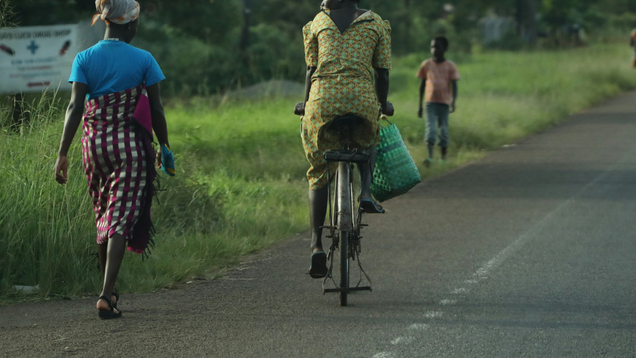Webinar Summary – Feminism in Public Debt: A Human Rights Approach

On November 7, 2024, the Boston University Global Development Policy Center (GDP Center) hosted Marina Zucker-Marques, Senior Academic Researcher at the GDP Center, and Juan Pablo Bohoslavsky, Researcher at the National Scientific and Technical Research Council of Argentina (CONICET), to discuss their new book, “Feminism in Public Debt: A Human Rights Approach,” as part of the Fall 2024 Global Economic Governance Initiative Book Talk Series.
“Feminism in Public Debt: A Human Right’s Approach,” which is open access access (available in English and Spanish), explores the intersection of feminism, human rights and sovereign debt, highlighting that debt-related economic policies are widening gender-related disparities. Topics covered in the book include childcare, education, institutionalizing a gender approach in public finances, a feminist approach to debt sustainability analyses and more. Bohoslavksy was a co-editor of the volume with Mariana Rulli, Senior Researcher and Professor of Political Science at the National University of Rio Negro (CIEDIS). Zucker-Marques contributed a chapter titled “Debt, Development and Gender” with Penelope Hawkins, Senior Economic Affairs Officer at the United Nations Conference on Trade and Development.
In Bohoslavsky’s brief introduction of the volume, he emphasized the need for structural solutions to the issue of feminism in public debt. Zucker-Marques, as she moved into discussing key findings from her co-authored chapter, also underscored the need for an interdisciplinary approach, from law to economics. Her chapter focuses on how a debt-led growth model could bring negative impacts on women during its two phases of debt accumulation and austerity. In the debt accumulation phase, public debt service competes with investments in social services, which are especially important to compensate gender inequalities in our society. The austerity phase kicks in following an external shock, this leads to cuts in public spending disproportionately affect women, particularly in healthcare, education and employment. Women are more likely to bear the brunt of austerity as citizens, caregivers and public sector employees. Cuts in health and social services exacerbate gender inequality, often leading women to take on unpaid labor to fill gaps.
For instance, Zucker-Marques pointed out that women in countries that don’t have a public or universal health system take on more debt to bear the costs of health care when the government cannot provide these services due to austerity. Furthermore, women are disproportionately employed in the public sector, and when countries carry out austerity cuts, government expenditure are usually the first to take a hit. Finally, women are the austerity absorber of the last resort when child and elderly expenditure care is cut, they must take on more unpaid care work. Yet, when women have more access to infrastructure such as energy, transportation and sanitation, they can be productive members of the labor force, underscoring the need to preserve women’s rights to public services.
Addressing the issue of global institutions approach to women in debt, Bohoslavsky discussed a human rights approach within International Monetary Fund (IMF) operations. Notably, he pointed out how the IMF’s current gender strategy is short-sighted, ignoring, for instance, the impact of austerity on women. Similarly, he noted that the World Bank emphasizes economic empowerment and civil rights but neglects structural solutions to gender inequality with a limited focus on micro-loans and privatization of health care. Bohoslavsky wrote off this stance as a moderate form of feminism that fits with the neoliberal ideals, in that it appropriates the notion of gender without any emancipatory effects of feminism.
Zucker-Marques and Bohoslavsky also discussed reforms of the international financial architecture to support women’s status. Bohoslavsky highlighted the need of a comprehensive approach, including strengthening capital controls and reforming the debt architecture to facilitate debt relief. Beyond that, he argued that it is fundamental to reform Debt Sustainability Analyses (DSAs) to include public expenditures that protect human rights, and foster progress on the UN 2030 Sustainable Development Goals and climate goals.
Bohoslavsky also proposed a human rights-based reinterpretation of risk premiums. The current system is based on a misconception of risk, which leads to a price discrimination where low-income countries pay high-risk premiums based on projections of default risk. However, these premiums remain unchanged even when the risk does not materialize. Bohoslavsky suggested adjusting interest rates and risk premiums after the principal has been fully repaid, and he further questioned why risk premiums are not treated as a form of collateral that can be reimbursed to borrowers who demonstrate reliable repayment behavior. Zucker-Marques underscored the importance of this proposal, noting that the historical default rates of developing countries are low and often do not justify the exorbitant risk premiums charged. Here, she advocated for more aid and cheaper financing.
Wrapping up the discussion Zucker-Marques prompted Bohoslavsky to highlight a research priority for future work. He acknowledged that one of the biggest challenges lies in translating human rights principles into quantitative metrics that can guide financial reforms. Ultimately, answering this question requires interdisciplinary work where economists, legal scholars and personnel from international financial institutions collaborate to understand and align each other’s interests.
*
Never miss an update: Subscribe to the Global Economic Governance Newsletter.